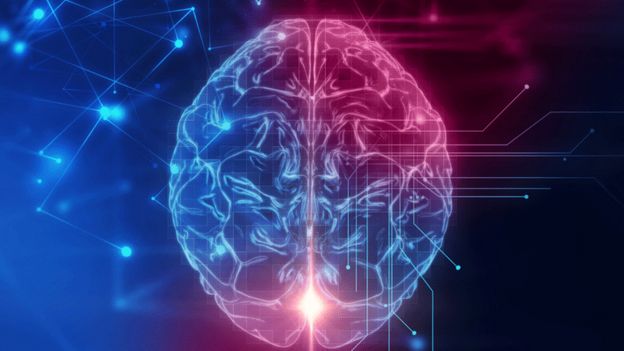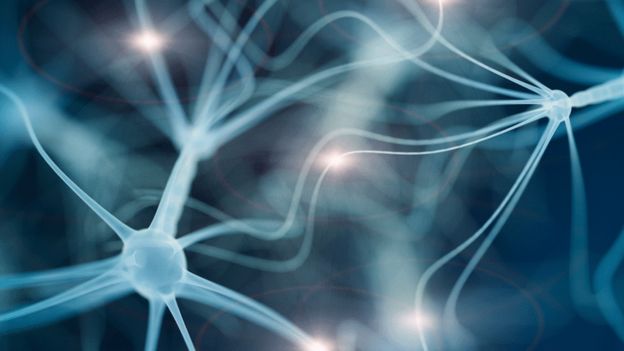
Audio By Carbonatix
Nigerian Oshi Agabi has unveiled a computer based not on silicon but on mice neurons at the TEDGlobal conference in Tanzania.
The system has been trained to recognise the smell of explosives and could be used to replace traditional airport security, he said.
Eventually the modem-sized device - dubbed Koniku Kore - could provide the brain for future robots.
Experts said that making such systems mass-market was challenging.
All of the big tech firms, from Google to Microsoft, are rushing to create artificial intelligence modelled on the human brain.
While computers are better than humans at complex mathematical equations, there are many cognitive functions where the brain is much better: training a computer to recognise smells would require colossal amounts of computational power and energy, for example.
Mr Agabi is attempting to reverse-engineer biology, which already accomplishes this function with a fraction of the power it would take a silicon-based processor. "Biology is technology. Bio is tech," he says. "Our deep learning networks are all copying the brain."
He launched his start-up Koniku over a year ago, has raised $1m (£800,000) in funding and claims it is already making profits of $10m in deals with the security industry.
Koniku Kore is an amalgam of living neurons and silicon, with olfactory capabilities — basically sensors that can detect and recognise smells.
"You can give the neurons instructions about what to do - in our case we tell it to provide a receptor that can detect explosives."
He envisages a future where such devices can be discreetly used at various points in airports, eliminating the need for queues to get through airport security.
As well as being used for bomb detection, the device could be used to detect illness by sensing markers of a disease in the air molecules that a patient gives off.

Oshiorenoya Agabi wants to create a brain-based computer system
The prototype device shown off at TED - the pictures of which cannot yet be publicly revealed - has partially solved one of the biggest challenges of harnessing biological systems - keeping the neurons alive, said Mr Agabi.
In a video, he showed the device being taken out of the lab.
"This device can live on a desk and we can keep them alive for a couple of months," he told the BBC.
Ultimately though he has much bigger ambitions.
"We think that the processing power that is going to run the robots of the future will be synthetic biology-based and we are laying the foundations for that today."
The fusion of biology and technology gained headlines recently when Elon Musk, chief executive of Tesla and Space X, announced his latest venture - Neuralink - which aims to fuse the human brain with AI, using neural lace.

Much of Al research is focused on mimicking the job of neurons
Advances in neuroscience, bioengineering and computer science means that much more is known about how the human brain works than ever before.
This is fuelling the development of neuro-technology - devices that aim to mould the brain into computers.
Much of the current work is aimed at improving brain function, particularly for those with brain-related injuries or diseases.
Prof John Donoghue, who heads up the Wyss Centre for bio and neuro-engineering in Geneva, has been at the forefront of work attempting to allow people with paralysis to move limbs using their brain waves.
He believes the field is at a "tipping point" where biological and digital systems will come together.
The idea being pursued by Mr Agabi is interesting, he said.
"Digital computers are fast and reliable but dumb, whereas neurons are slow but smart," he said.
"But they are not so good in a little dish and the big problem will be keeping them alive and happy. That is going to be a big challenge," he added.
"Will we have a dish of neurons computing on our desk? I don't know."
But he added that scientists in Geneva were already able to "keep neurons in a dish and communicate with them for a year", adding that such systems were an "exciting tool to study brain circuitry".
Other scientists are developing silicon chips which mimic the way that neurons work and could ultimately prove more stable, he said.
But Mr Agabi is not convinced such systems will win out over his.
"The idea of mimicking silicon is very hard and we don't think it can be scaled," he told the BBC.
Latest Stories
-
Divers recover bodies of seven Chinese tourists from bottom of Lake Baikal
53 minutes -
From windstorm to resilience: How Wa school is growing climate protection
1 hour -
Reclaiming the Garden City: Dr. Kwame Adinkrah urges Kumasi to rein in billboard proliferation
2 hours -
Bursar of Ghanata SHS arrested for alleged diversion of student food supplies
2 hours -
Trump says he will increase global tariffs to 15%
2 hours -
Bogoso-Prestea mine records first gold pour after 24-month shutdown
2 hours -
Ghana–ECOWAS talks end with renewed push for women and youth political inclusion
3 hours -
Interior Minister receives Hudai Foundation food donation for prison inmates during Ramadan
3 hours -
UBIDS to benefit from pre-fabricated US$6.6m 1k capacity classroom project
3 hours -
Interior Minister launches Automated Fire Safety Compliance System to enhance public safety
3 hours -
Africa must lead climate intervention conversation – Experts
3 hours -
Ghana hosts high-level ECOWAS meeting to boost women and youth political participation
4 hours -
Canada looks to trade talks after US Supreme Court tosses Trump’s tariffs
5 hours -
Ghana, Burkina Faso sign 7 cooperation agreements to deepen bilateral ties
5 hours -
Duraplast supports Accra sanitation drive with donation of 20 waste bins
5 hours

